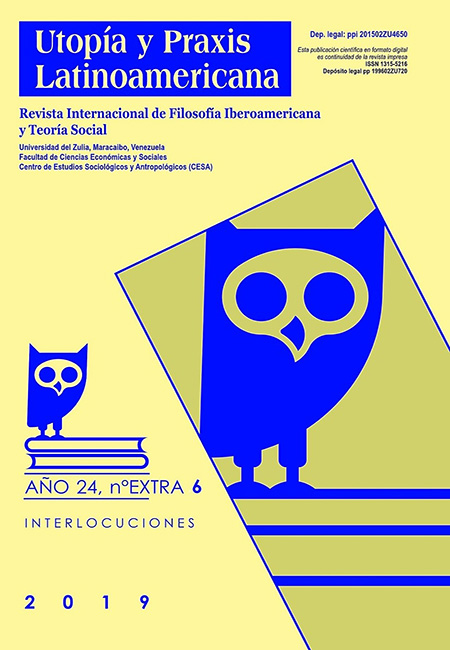Critical thinking skills of undergraduate students of educational sciences at Tehran universities
Resumen
ABSTRACT
The present study aims to investigate the critical thinking skills of students in the educational sciences of Tehran universities. The population of study is undergraduate students of educational sciences of Tehran universities and the sample is 200 students of educational sciences selected using the stratified random sampling method. Data were collected using the California Critical Thinking Skills Test and analyzed using the one-sample t-test and multivariate analysis of variance. The results showed that the total score of critical thinking among undergraduate students of educational sciences was lower than the assumed mean value.
RESUMEN
El objetivo del presente estudio es investigar las habilidades de pensamiento crítico de los estudiantes de ciencias educativas de las universidades de Teherán. La población del estudio son estudiantes universitarios de ciencias educativas de las universidades de Teherán y la muestra es de 200 estudiantes de ciencias educativas seleccionados mediante el método de muestreo aleatorio. Los datos se recolectaron usando la prueba (CCTS) y se analizaron usando la prueba t de una muestra y el análisis de varianza multi-variante. Los resultados mostraron que la puntuación total del pensamiento crítico entre los estudiantes universitarios de ciencias de la educación fue inferior al valor medio supuesto.
Citas
BIBLIOGRAPHY
ABRAMI, PC, BERNARD, RM, BOROKHOVSKI, E, WADE, A, SURKES, MA, TAMIM, R, & ZHANG, D (2008). “Instructional interventions affecting critical thinking skills and dispositions: A stage 1 meta-analysis”. Review of Educational Research, 78(4), pp. 1102-1134.
ASSADI, N, DAVATGAR, H, & JAFARI, P (2013). “The effect of critical thinking on enhancing writing among Iranian EFL learners”. International journal of scientific & engineering research, 4(3), pp. 1-7.
FACIONE, P (1990). “Critical thinking: A statement of expert consensus for purposes of educational assessment and instruction (The Delphi Report)”.
GHANBARI-HASHEMABADI, B, GERAVAND, H, MOHAMMADZADEH GHASR, A, & HOSSEINI, AA (2012). “Investigating the Relationship between Critical Thinking and Self-directed Learning and its Role in Academic Success in Nursing and Midwifery Students in Mashhad”. Yazd Medical Sciences Education Studies and Development Quarterly, 4, pp. 15-21.
GLICKEN, A, & MERENSTEIN, B (2007). “Addressing the hidden curriculum: Understanding educator professionalism”. Medical Teacher, 29, pp. 54–57.
GUNN, TM, GRIGG, LM, & POMAHAC, GA (2008). “Critical thinking in science education: Can bioethical issues and questioning strategies increase scientific understandings”. The journal of Educational thought, 42(2), pp. 165-183.
HALPERN, DF (1999). New Direction for Teaching and Learning, Teaching for Critical Thinking: Helping College Students Develop the Skills and Dispositions of a Critical Thinker. Jossey-Bass Publishers.
HAN, HS, & BROWN, ET (2013). “Effects of critical thinking intervention for early childhood teacher candidates”. The Teacher Educator, 48, pp. 110–127.
HASHEMI, S, SALEHI-OMRAN, S, & KARAMKHANI, Z (2014). Critical Thinking as the Missing Link in the Higher Education System: Investigating Students' Critical Thinking Skills and their Teaching by University Lecturers. 8 (27), pp. 99-123.
JAWARNEH, M, IYADAT, W, AL-SHUDAIFAT, S, & KHASAWNEH, L (2008). “Developing Critical Thinking Skills of Secondary Students in Jordan Utilizing Monro and Slater Strategy, and McFarland Strategy”. International Journal of Applied Educational Studies, 3(1).
KALOGEROPOULOS, P, RUSSO, JA, SULLIVAN, P, KLOOGER, M, & GUNNINGHAM, S (2020). “Re-enfranchising Mathematically-alienated Students: Teacher and Tutor Perceptions of the Getting Ready in Numeracy (G.R.I.N.) Program”. International Electronic Journal of Mathematics Education, 15(1).
KAVIANI-MEHR, M, SALIMI, M, & LIYAGHAT, R (2015). “Psychometric Properties of Watson-Glaser Critical Thinking Test and its Relationship with Creativity”. Applied Psychological Research, 6 (2), pp. 86-99.
KHOSROWJERDI, M, & GHORBAN-JAHROMI, R (2007). “Investigating the Relationship between Critical Thinking of Postgraduate Students with their Information Seeking Behavior”. Journal of Informatics, 2, pp. 133-151.
LAUREANO, RMS, FERNANDES, AL, HASSAMO, S, & ALTURAS, B (2018). “Facebook Satisfaction and Its Impacts on Fundraising”: A Case Study at a Portuguese Non-Profit Organization. Journal of Information Systems Engineering & Management, 3(1), pp. 4-7.
MOHAMMADI, S, & YEKTA, P, (2018). “The Effect of Emotional Intelligence on Job Satisfaction among Stuff Nurses in Intensive Care Units”. UCT Journal of Social Sciences and Humanities Research, 6(2), pp. 1-7.
MOTTAGHI, Z, NAJAFI, M, NOSRATI HASHI, K, & HATAMI, M (2017). “The Role of Critical Thinking Components in Predicting Medical Students' Self-efficacy (Case Study: Students of Isfahan University of Medical Sciences)”. Modern Educational Approaches, 12 (2), pp. 46-59.
NOORADI, M, BAGHERI NIA, H, & OULIAEY, A (2017). “Are the manager's bases of power related to job satisfaction?” UCT Journal of Management and Accounting Studies, 5(3), pp. 71-75.
NOSRATI HASHI, K, NASRABADI, H, BAGHERI NO-PARAST, KH, & RAADMARD, S (2017). “The Components of Constructive Doubt in Late Wittgenstein's Thought and its Educational Consequences in the Training of Critical Minds”. Journal of the Education Principles, 1 (7), pp. 5-26.
PAIVIO, A (2014). Mind and its evolution: A dual coding theoretical approach. Psychology Press.
PAKDEL, M, & ASHRAFI, M (2019). “Relationship between Working Capital Management and the Performance of Firm in Different Business Cycles”. Dutch Journal of Finance and Management, 3(1).
RADULOVIC, L, & STANCIC, M (2017). “What is needed to develop critical thinking in schools?”. CEPS Journal, 3, pp. 9-25.
STAPLETON, P (2011). “A survey of attitudes towards critical thinking among Hong Kong secondary school teachers: Implications for policy change”. Thinking Skills and Creativity, 6(1), pp. 14-23.
VAHEDI, SH, MARANDI HEYDARLOO, M, & IMANZADEH, A (2015). “The Relationship between Emotional Intelligence and Critical Thinking in Undergraduate Nursing Students of Tabriz University of Medical Sciences”. Journal of Development Strategies in Medical Education, 2 (1), pp. 47-57.
VOJDANI, F (2015). “Strategies for Fostering Students' Critical Thinking with an Emphasis on the Role of Faculty Members”. Higher Education Quarterly, 8 (29), pp. 133-152.









